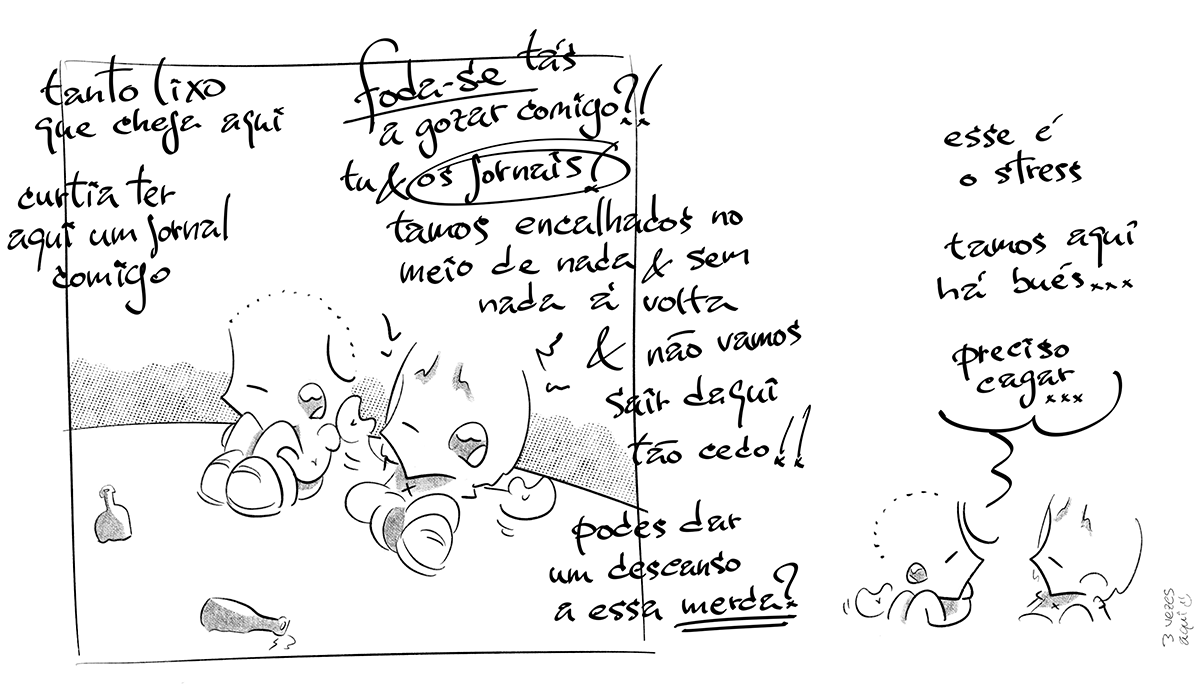malformados e o mal que fica
News organizations should be careful how they frame things. Calling a protest peaceful suggests that the default is a violent one. Mentioning that a Black man was unarmed suggests that the default is an armed Black man.
in "It’s time to change the way the media reports on protests. Here are some ideas." 14 jun 2020
Sumarizando as últimas duas semanas: injustiças, e quem escreve a história porque a “disputa do passado é a disputa do presente”, uma receita cozinhada pelos de sempre e servida à mesa pelos garçons de serviço — uma metáfora que só não se presta à poética porque não presta para começar: neste quadro o chef não está na cozinha mas sentado à mesa a ser servido. Não lhe temos ilusões, é mesmo aos miúdos que o servem que tentamos ainda a pachorra.
Teens e jornalismo: sabemos das revisões que alimentaram a primeira salva original de fascistas (*)E, entre outros, os professores. Full disclosure: por uns anos este vosso escriba foi teen, situação que começou ali pela puberdade. Por uns tempos a meio dessa fase também teve um pequeno cartão que o dizia jornalista. E por mais anos do que desejaria foi também professor universitário. Foram fases, mas está tudo bem e já passou. — são também temas chave por aqui, como aquilo das elites e a sua tendência de correr em sentido contrário ao bem comum. Importa pois ter os putos a fazer bom jornalismo: mais do que manifestações que terminam em “desilusão e a desordem”, seguimos da cartilha do último ensaio de colectivo anónimo que por estas partes partilhamos. O mundo muda-se metendo as pessoas certas nos lugares que contam.
E desses lugares, que nos contam?
Se nos conhecem, conhecem a resposta: nada que preste.
"Why does this matter?"
1) The role of protest is to publicize grievances from people who typically exist outside of traditional power structures.
2) The general public’s opinions about protests and the social movements behind them are formed in large part by what they read or see in the media.
3) This gives journalists a lot of power when it comes to driving the narrative of a demonstration.
1) in "It’s time to change the way the media reports on protests. Here are some ideas." 14 jun 2020
2) e 3) in "Riot or resistance? The way the media frames the unrest in Minneapolis will shape the public’s view of protest" 30 maio 2020
Ora os mais atentos a todas-as-coisas-media já terão notado que estes conduzem as narrativas de forma pouco inclusiva aos que estão outside of traditional power structures. Aliás, parecem mesmo servir sobretudo à voz do dono. Não é paranoia, senhores, é ciência (*). Retalhado para brevidade:
National media editorial choices mirror a framework social scientists have dubbed the “protest paradigm”. The paradigm traces its origins to at least the 1980s, when researchers looked at how the media covered anti-war protests. It’s the idea that the press contributes to the political status quo by reinforcing whatever the government thinks. In essence, when it comes to protests, this means that the media is biased toward the status quo. While this idea can “seem a little conspiracy theory,” this is generally how it plays out in practice.
in "It’s time to change the way the media reports on protests. Here are some ideas." 14 jun 2020
*) Ref. ao "The Public Nuisance Paradigm: Changes in Mass Media Coverage of Political Protest since the 1960s" 1 mar 2010 de Damon T. Di Cicco, "a 2010 study that analyzed 40 years of protest coverage found that the papers depicted protests, even peaceful ones, as nuisances rather than as necessary functions of democracy."
They held that media narratives tend to emphasize the drama, inconvenience, and disruption of protests rather than the demands, grievances, and agendas of protesters. These narratives trivialize protests and ultimately dent public support.
in "Riot or resistance? The way the media frames the unrest in Minneapolis will shape the public’s view of protest" 30 maio 2020
A curto prazo desejar um melhor jornalismo parece-nos utópico, clássico caso do “it is difficult to get a man to understand something when his salary depends upon his not understanding it”. Mas podemos treinar graus de resistência à sua exposição. Imprensa sim, mas segundo o método científico: é tudo teoria até comprovamos a dita. Se lá há verdade, é preciso conseguir encontrá-la.
We weren’t looking at a stream of videos of violence erupting or clashes breaking out. We were looking at cops, attacking people. The media’s use of the word “clashes” [is] especially problematic, because it creates a false image that protesters are lining up to battle with police or authority figures. And, by extension, it places the blame on protesters for any ensuing violence.
in "It’s time to change the way the media reports on protests. Here are some ideas." 14 jun 2020

